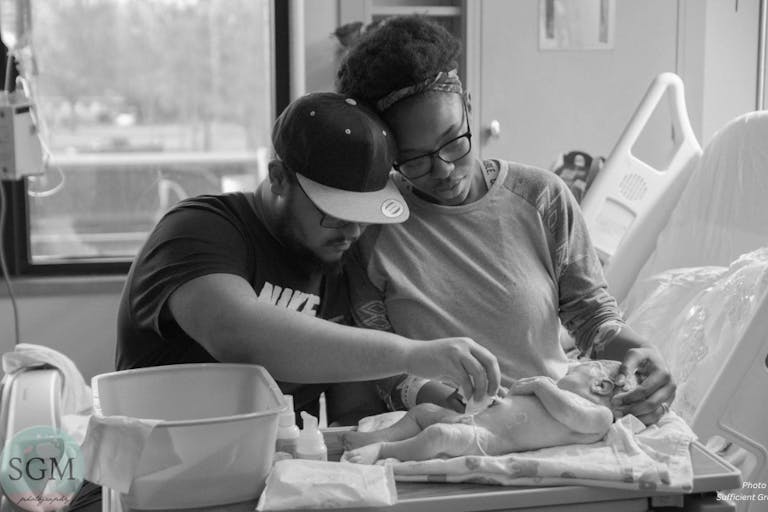
‘I’m bathing my baby:’ Perinatal hospice shows how every baby should be treated
Nancy Flanders
·
Abortion chain arguing at Supreme Court known for dirty equipment, untrained staff
The case Whole Woman’s Health v. Hellerstedt, being heard by the Supreme Court, will determine whether the clinic regulations signed into effect by Texas Governor Rick Perry will stand or be struck down as unconstitutional. These regulations require abortionists to have admitting privileges and require abortion facilities to meet the same safety standards as other outpatient facilities, such as those that perform eye surgery and colonoscopies.
Texas Alliance for Life reported yesterday that this same abortion chain that is currently fighting before the Supreme Court to strike down a law on abortion safety regulations has a history of failed inspections, dirty equipment, untrained staff and other health violations. (Earlier this month, Live Action News reported on this discovery here and here.) These repeated health violations among the Whole Woman’s Health chain show that there is a pattern of serious mismanagement among these Texas facilities.
Whole Woman’s Health’s CEO claims they have “40 years of safe abortion on record in Texas” and offer “high-quality” care, but reports of serious health violations dating back as far as 2007 have been uncovered.
Texas Alliance for Life shares their findings from as early as 2011…
Fort Worth Whole Woman’s Health
A March 2011 inspection found:
… employees in Fort Worth were not properly sterilizing equipment, and they had expired medications and equipment available for use in patient rooms. Further, drugs used to cause medical abortions were being store in an unlocked and unsecured cabinet.
Some of the equipment listed in the report are “tenaculums” – grasping forceps used to hold the cervix and uterus in place during an abortion. The report indicates that these were not sterilized in the proper position for killing pathogens, which would have put future patients at great risk, and could have led to severe and life threatening infections. Among the expired medications were antibiotics for preventing and fighting infection, such as Gentamicin and Ampicillin. Along with this, it was noted that staff, and even the clinical director, were untrained in providing basic life support to patients. Abortion drugs weren’t just found in unlocked cabinets – they were even found in an unlocked file cabinet with employees unable to explain why they were there. While policies and procedures were documented, they were clearly not being followed at the Fort Worth Whole Woman’s Health facility.
In 2014, another inspection at the same facility again found that surgical instruments were not being properly sterilized or stored.
Beaumont Whole Woman’s Health
Similar problems were found in 2011 at WWH’s Beaumont facility, which is currently closed. According to Texas Alliance for Life:
… staff were not trained in the sterilization process, the facility failed to staff a trained nurse, the suction machines had rusty spots, the floors were stained and discolored, the staff were not properly trained in CPR, and the facility failed to provide proper emergency equipment.
These deficiencies could have meant death for a woman injured in an abortion.
Article continues below
Dear Reader,
In 2026, Live Action is heading straight where the battle is fiercest: college campuses.
We have a bold initiative to establish 100 Live Action campus chapters within the next year, and your partnership will make it a success!
Your support today will help train and equip young leaders, bring Live Action’s educational content into academic environments, host on-campus events and debates, and empower students to challenge the pro-abortion status quo with truth and compassion.
Invest in pro-life grassroots outreach and cultural formation with your DOUBLED year-end gift!
A 2013 inspection at the Beaumont facility found similar issues:
“numerous rusty spots on the suction machines used on the patient,” “expired drugs,” unlabeled “pre-filled medication cups,” “a large hole in the cabinet flooring … [that] had the likelihood to allow rodents to enter the facility,” as well as numerous other health and safety violations.
The suction machine is the mechanism behind the suction aspiration technique, used most commonly in first-trimester abortions. Watch a description of the suction aspiration abortion below:

San Antonio Whole Woman’s Health
An August 29, 2013, an inspection of Whole Woman’s Health in San Antonio showed violations of a similar nature to those found in the other facilities. Inspectors found that surgical instruments were not properly sterilized due to improper use of the autoclave on the premises. Infection control was also poor, with soiled and clean instruments becoming cross-contaminated due to improper procedures. Medications were improperly stored, staff were not properly trained in sterilization techniques, and the facility used ineffective cleaning and sterilizing supplies on surgical instruments.
McAllen Whole Woman’s Health
Again, similar problems were found in another inspection at Whole Woman’s Health’s McAllen facility on September 4 – improperly trained staff and improper infection control procedures.
Combined violations at Whole Woman’s Health
Just last year, in 2015, inspectors found a whopping 43 pages of violations at the Fort Worth, San Antonio, and McAllen Whole Woman’s Health facilities. These included:
unqualified personnel, “cracks” and “rips and tears” in the vinyl covers on the exam tables, suction machines “covered in dust,” improper sterilization of instruments, clean medical supplies three feet away from where the body parts of aborted babies were examined, failure to “store hazardous cleaning solutions and compounds in a secure manner,” and many other egregious violations.
As hard as it is to believe, the very same chain of abortion facilities that is currently arguing before the Supreme Court that abortion is safe and no further regulations are needed, has been cited for serious safety violations in no fewer than 10 inspections over the course of four years.
Is this the kind of care women deserve? Or do women deserve better than than Whole Woman’s Health?
Live Action News is pro-life news and commentary from a pro-life perspective.
Contact editor@liveaction.org for questions, corrections, or if you are seeking permission to reprint any Live Action News content.
Guest Articles: To submit a guest article to Live Action News, email editor@liveaction.org with an attached Word document of 800-1000 words. Please also attach any photos relevant to your submission if applicable. If your submission is accepted for publication, you will be notified within three weeks. Guest articles are not compensated (see our Open License Agreement). Thank you for your interest in Live Action News!

Nancy Flanders
·
Analysis
Cassy Cooke
·
Analysis
Angeline Tan
·
Analysis
Cassy Cooke
·
Politics
Madison Evans
·
Opinion
Nancy Flanders
·
Guest Column
Sarah Terzo
·
Abortion Pill
Sarah Terzo
·
Guest Column
Sarah Terzo
·
Guest Column
Sarah Terzo
·
Guest Column
Sarah Terzo
·